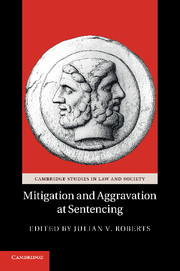Book contents
- Frontmatter
- Contents
- Tables
- Contributors
- Foreword
- Acknowledgments
- Chapter one Punishing, more or less
- Chapter two Re-Evaluating the Justifications for Aggravation and Mitigation at Sentencing
- Chapter three The Search for Principles of Mitigation
- Chapter Four Personal Mitigation and Assumptions about Offending and Desistance
- Chapter Five Intoxication as a sentencing factor
- Chapter Six Beyond the Partial Excuse
- Chapter Seven Equality before the law
- Chapter Eight Personal mitigation
- Chapter Nine Exploring Public Attitudes to Sentencing Factors in England and Wales
- Chapter Ten The Pernicious Impact of Perceived Public Opinion on Sentencing
- Chapter Eleven Addressing Problematic Sentencing Factors in the Development of Guidelines
- Chapter Twelve Proof of Aggravating and Mitigating Facts at Sentencing
- Chapter Thirteen Mitigation in Federal Sentencing in the United States
- Chapter Fourteen The discretionary effect of mitigating and aggravating factors
- Index
- References
Chapter Six - Beyond the Partial Excuse
Australasian Approaches to Provocation as a Sentencing Factor
Published online by Cambridge University Press: 07 September 2011
- Frontmatter
- Contents
- Tables
- Contributors
- Foreword
- Acknowledgments
- Chapter one Punishing, more or less
- Chapter two Re-Evaluating the Justifications for Aggravation and Mitigation at Sentencing
- Chapter three The Search for Principles of Mitigation
- Chapter Four Personal Mitigation and Assumptions about Offending and Desistance
- Chapter Five Intoxication as a sentencing factor
- Chapter Six Beyond the Partial Excuse
- Chapter Seven Equality before the law
- Chapter Eight Personal mitigation
- Chapter Nine Exploring Public Attitudes to Sentencing Factors in England and Wales
- Chapter Ten The Pernicious Impact of Perceived Public Opinion on Sentencing
- Chapter Eleven Addressing Problematic Sentencing Factors in the Development of Guidelines
- Chapter Twelve Proof of Aggravating and Mitigating Facts at Sentencing
- Chapter Thirteen Mitigation in Federal Sentencing in the United States
- Chapter Fourteen The discretionary effect of mitigating and aggravating factors
- Index
- References
Summary
Most mitigating factors will be relevant only at sentence – for example, good character, remorse, a plea of guilty, stress or personal crisis, or assistance to law enforcement authorities. Some factors, however, are more substantial and may be relevant for both the determination of guilt and for sentence because they relate to the offender’s responsibility or culpability for the offence. Thus a factor such as self-defence may result in a complete acquittal or a conviction for a lesser offence such as manslaughter on a charge of murder, or it may be a mitigating factor at sentencing. Mental disorder is another factor with multiple applications. Youth is generally recognized as a mitigating factor, but is also formally recognized in almost every jurisdiction by a separate sentencing regime that applies different sentencing principles and sanctions from those available in the adult courts.
Of the hundreds of sentencing factors, provocation has been among the most controversial, problematic and variable in its treatment by the law. It is a factor that has been dealt with at all stages of the criminal process and with various consequences. In some jurisdictions it is treated as a partial defence to the crime of murder, reducing it to manslaughter; in others it is now relevant only to sentencing in murder cases. For some non-fatal offences against the person, provocation is a complete defence (resulting in acquittal) in some jurisdictions, while in others it is a mitigating factor to be considered in sentencing.
- Type
- Chapter
- Information
- Mitigation and Aggravation at Sentencing , pp. 102 - 123Publisher: Cambridge University PressPrint publication year: 2011
References
- 4
- Cited by



